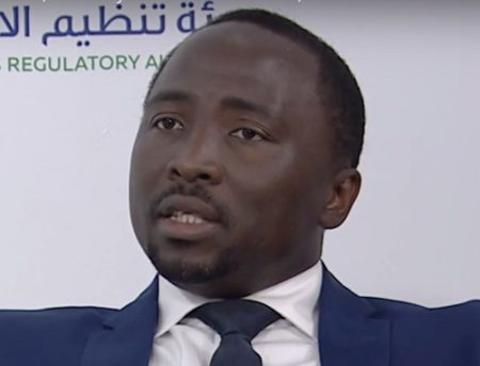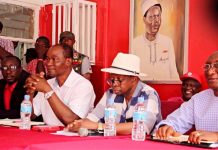Africa-Press – Sierra-Leone. Sierra Leone’s Covid-19 audit report uncovers “massive” corruption in the management and utilisation of funds by the National Coronavirus Emergency Response Centre (NaCOVERC) and other Government Ministries, Departments and Agencies. (Photo above – Head of NaCOVERC, Mr Solomon Jamiru).
The report highlights that the failure by the Strategic Leadership Team at NaCOVERC to develop a cohesive strategy to guide the overall national response to the pandemic, could have contributed to more infections and possible loss of lives.
The auditors established that during the height of the outbreak in Sierra Leone, (i.e. from April to August 2020), there was no well-developed and focused strategy to guide the national response to the pandemic, and as such, decisions relating to threat assessment, resources mobilisation, recruitment and training of skilled personnel, management of quarantined facilities, identification of primary and secondary contacts and caring for infected persons and their families could have been made on ad-hoc and subjective basis; in an uncoordinated and inconsistent manner, giving rise to inefficiency and ineffectiveness in the overall national response to the virus.
“This may have led to an ineffective but yet expensive operations to date. This state of affairs may have negatively impacted the fight against the COVID-19,” the report states.
The auditors blamed this sorry state of affairs on the Strategic Leadership Team who were paid allowances in excess of Le3.1 billion but could not develop a very important document in time.
“It was noted that Sierra Leone took about 126 days, from the date of the announcement of the indexed case on 31st March 2020 to the production of a response plan on 5th August 2020. On the other hand, the small West African state of The Gambia was able to produce a similar strategy within 71 days of announcing its first case,” the report states.
The report reveals how a Le651 million contract awarded to Speedwing Investment (SL) Ltd. for the procurement of thirty motorbikes for the Office of National Security was overpriced by Le276 million. This contract was awarded through Sole Sourcing. The auditors discovered that Speedwing Investment was not in the business of selling motorbikes but they were awarded the contract.
Examining the contract details and delivery note, the specification was for the procurement of KAM-125 motorbikes.
Speedwing Investment set the contract price of one unit (1 motorbike) at Le21.7 million. KAM Enterprises, the primary supplier of KAM-125 motorbikes, sells one KAM-125 motorbike for Le12.5 million. But they were never considered to be awarded such a contract, even though Speedwing Investment was to purchase the thirty motorbikes from KAM Enterprises. The auditors say that the award of this contract to Speedwing Investment is largely questionable and the contract price was “hugely inflated,” leading to the loss of Le276,060,000 to the State.
“The contract price of Le21,702,000 per unit was exceptionally expensive as discovered by the auditors. These same motorbikes could have been purchased for Le12,500,000, from the primary supplier – KAM Enterprises. As a result of such overpricing, the Government and people of Sierra Leone, may have lost the sum of Le276,060,000,” the Auditor General concluded.
The report also unearths massive corruption inherent in a Le20 billion contract signed between the Ministry of Transport and Aviation (MTA) and Anagkazo Ventures for the supply of 30 brand new assorted vehicles and 100 motorbikes (TVS-ZT-125 model) for and on behalf of NaCOVERC.
The auditors say that the decision taken by the Ministry of Transport and Aviation to engage Anagkazo Ventures as a middleman in this deal resulted in a total inflated price of Le3.2 billion.
They also discovered that two of the vehicles delivered were not brand new.
The report states: “With regard to the unit price of the motorbikes (TVS ZT-125 Model) of Le19,000,000, it was observed that the price was hugely inflated, as the same could have been purchased for Le 13,225,000 (including GST). This lack of due care by the MTA has led to the waste of Le 577,500,000 of public funds.
“In relation to the contract price of Le 16,261,000,000 for the 30 assorted vehicles, it was observed that the price was hugely inflated, as the same would have been purchased form CICA Motors (the official Toyota dealer in Sierra Leone) for Le13,596,725,516. This lack of due care by the MTA has led to a further loss of Le2,664,274,484 of public funds.”
The auditors also found out that the procurement of sixty motorbikes (KAM-125 model) totalling Le1.3 billion for the Republic of Sierra Leone Armed Forces (RSLAF) was overpriced by Le552,120,000. This contract was also awarded to Speedwing Investment using the Sole Sourcing method.
“With regard to the unit price of the motorbikes (KAM-125 model) of Le21,702,000, it was observed that the price was hugely inflated, as the same could have been purchased from the primary supplier (i.e. KAM 125 Enterprise), for Le12,500,000. This lack of due care by the RSLAF has led to the waste of Le 552,120,000 of public funds,” the editors stated.
The auditors noted the response provided by the Ministry of Defence. Though the latter claimed to have fully complied with the procurement rules and regulations, the auditors maintained that the evidence submitted by the Ministry was “inappropriate” and could not justify the overpricing of the contract.
It reads: “The Ministry also attached the price norm for the first quarter of 2020, together with letters between themselves and the supplier Speedwing Investment in relation to the GST payment. Following a review and verification of the above response to the draft audit report, and the supporting documents provided, the auditors concluded as follows: (a) The RSLAF did not provide evidence of a GST invoice and a receipt from NRA as evidence of the payment of GST collected by the supplier. There is a high risk that the government has lost GST revenue of Le169,841,739. The NRA is required to apply Section 110(1) of the Income Tax Act 2000. (b) The extract from the NPPA price norm that was submitted by the RSLAF is for a completely different module of motor bike, so it’s inappropriate evidence. The audit therefore concluded the overpriced amount of Le552,120,000 should be recovered by the MoD officers that approved this transaction.”
With regards the procurement of forty motorbikes valued Le868 million (KAM-125) for the Sierra Leone Police, the auditors had this to say: “The SLP was allocated Le868,080,000 to procure 40 motorbikes for the institution. It was noted that the unit price of the motorbikes as per contract was highly inflated, thereby resulting in the possible loss of public funds of Le368,080,000.”
Forty-seven laptops purchased by NaCOVERC at a cost of Le476 million and reported by the Auditor General as missing, have now turned up at the ACC after their intervention, though the true value of the laptops remains in doubt.
A 50KVA generator valued nearly Le200 million, donated by the Chinese Embassy, could not be traced for verification. The Ministry of Health and Sanitation claimed that this generator was transferred to the Zimmy Makpele Peripheral Health Unit, but the auditors discovered, on their visit to the said PHU, that the 50KVA generator was not there.
Another Timbergate – Government loses $5 billion
The Auditor General’s report (2019) reveals how government lost huge revenue on timber exports totalling five billion dollars. The report uncovers “massive fraud” in the valuation of timber products and lays bare the neglect of the legislative framework to be used in valuating timber products during the period under review. It makes it categorically clear that the wrong method of valuating timber products was applied in complete disregard of the provisions set out in the Finance (Amended) Act of 2018.
The auditors say the law provides for the use of cubic meters to determine the value of timber products and the levy to be charged on same prior to exportation. The auditors found out that this method of valuation, as provided in Section 3 of the Finance (Amended) Act of 2018, was completely ignored, and instead 20-feet shipping containers were now used as unit of measurement to determine the price or value of the products ready for export.
According to the report, the Ministry of Finance says the use of cubic meters, as provided by law, was an “error” in the Finance Act 2018, and that “error” will be corrected in the Finance Act of 2021.
The report states: “The method of valuation for timber products prior to exportation was not in accordance with Section 3 of the Finance (Amended) Act of 2018. Instead of using cubic meters as required by law, 20-feet shipping containers were used as unit of measurement. Based on the ASYCUDA data from the Customs Department, a total of 2,201,024.88 cubic meters valued at US$5.5billion was exported. Revenue of US$25.7 million was recorded in the GPFS, thereby leaving a difference of US$5.48 billion. According to the Ministry of Finance, the discrepancy is due to an error in the drafting of the Finance Act (Amended) of 2018, but the necessary correction will be done in the Finance Act of 2021.”
The ACC says it is investigating.






